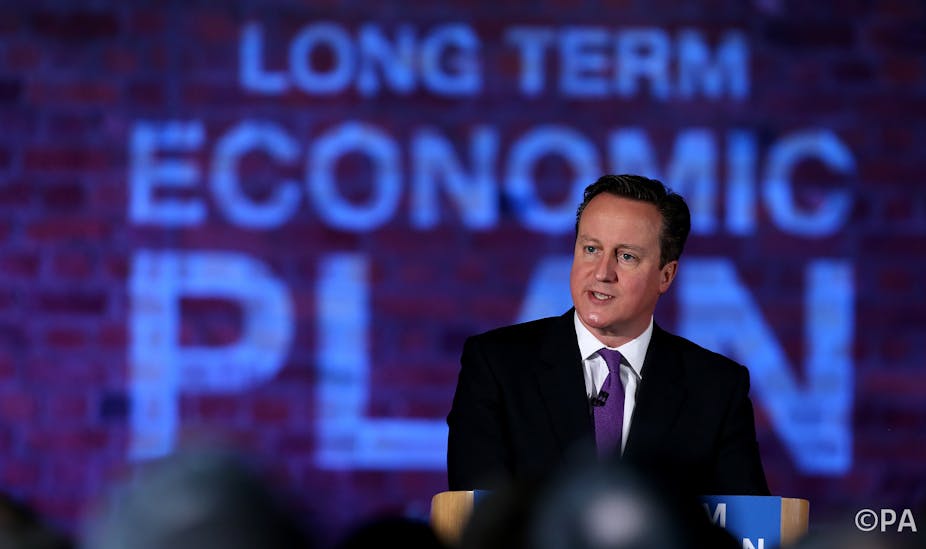For seasoned observers of general election campaigns, it is not surprising to see the Conservative Party styling themselves as the business-friendly party. Traditionally depicted as “the party of the rich”, the Conservatives have never struggled to win the support of the country’s boardrooms and executive classes. But flaunting the support of FTSE 350 business leaders doesn’t have the same weight as it did in years gone by.
Indeed, most of the 100 business figures that signed the letter of support for Conservative economic policies in The Daily Telegraph in early April were already known as Conservative donors and supporters. This “business backlash” against the Labour Party was compounded with attacks on its proposal to end non-domiciled taxation status, as well as ongoing concerns about Labour’s proposed mansion tax on expensive properties.
Historical precedent
The Conservative leadership called the Telegraph letter “unprecedented”, but similar manoeuvres have appeared in previous campaigns, and their effectiveness is open to question. For example, various business figures voiced fears about the perceived negative impact of Labour’s proposed minimum wage policy prior to the 1997 general election. But Labour still romped home with a landslide victory, and indeed implemented the policy with none of the horrific economic consequences that alarmist opponents had predicted.
It is also a much-used electoral tactic of incumbent politicians across the globe to highlight the need for stability and continuity at election time. At times of perceived national crisis this ploy can often succeed, with George W Bush’s narrow presidential victory in 2004 being an example where people stuck with what they knew.
But whether the atmosphere of the post-9/11 environment in the US can compare with feelings in the UK, recovering from recession, is open to debate. If people believe they are in the thick of economic crisis, they may be less inclined to risk the option of an alternative political approach. This will vary across the country, but could well be the reason for the Conservatives emphasising the economy, their “long term economic plan” and ability to keep recovery on track.
Influence over employees
Those that speak supportively of such high-profile business interventions into politics cite the fact that these business leaders employ hundreds of thousands of voters. The inference is clear that the interests of their employees have fuelled this letter as an altruistic act.
But will their employees share their sentiment? No business leader would say that their employees’ jobs are dependent on a Conservative victory on May 7, but this could be the insinuation – even if it only applies to the health of the company they work for. As far back as the 1872 Secret Ballot Act, voters have not officially been influenced by their employers, although that has not stopped employers from trying to sway their voting intentions.
More cynical minds may instead view the business leaders’ position as being based on more selfish motives. Conservative economic policies like cutting the top rate of income tax or cutting corporation tax have benefited big business leaders. Critics of these business leaders’ position have also pointed out that more neutral economists and academics have generally been far more critical of the current government’s long-term economic plan. This again raises questions about the business leaders’ reasons for stating their support for the Conservative Party.
Elections past
Business figures fearful of a Labour government are possibly buoyed by the fact that similar warnings have had an impact on close general elections in the past. Business fears about Labour’s economic agenda and its “tax bombshell” are believed to have been decisive in the closely-fought 1992 general election. But the subsequent economic problems endured by the Conservative government between 1992-1997 significantly undermined the reliability of the economic predictions of the Conservative Party and its business allies.
In addition to such uncertain predictions, it is arguably far less likely that these kind of alarmist tactics will be as successful in a far less deferential age, with employees responding to subtle political pressure from employers appearing to belong to a bygone era. In the age of social media and 24-hour news, employees have a far wider range of information at their disposal that can more effectively shape the way that they vote.
With a knife-edge general election predicted by the opinion polls, voters will have to decide whether or not to embrace such a pro-Conservative message from businesses. The alternative is to dismiss them as stemming from an out of touch and exclusive social elite. Fortunately nowadays the electorate has a much larger wealth of information to draw upon to make their decisions.

